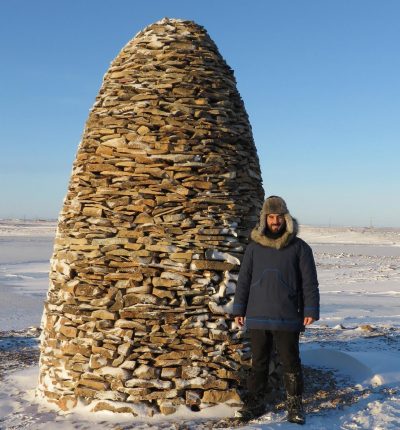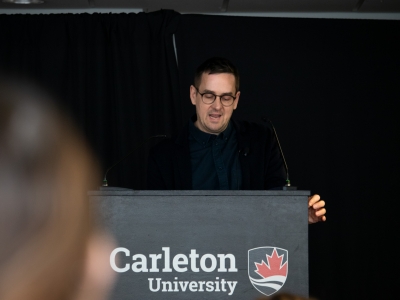PhD student, SPPA.
Joshua Gladstone spent several years working as a geologist in Nunavut before he discovered his true calling. He is now a PhD candidate in the School of Public Policy and Administration with a specialization in Political Economy.

Joshua, beside a cairn built by the Norwegian team working to salvage Roald Amundsen’s ship Maud, which was built to reach the North Pole but sank in Cambridge Bay in 1931. Picture taken in Cambridge Bay in October 2013.
You were raised in Toronto. What drew you to the North?
My family always appreciated nature and we spent lots of time outside when I was young, so I developed a real interest in and fondness for the outdoors.
That’s why I initially chose to study geology, because I wanted to find a way to have that connection with nature. That led me to a job on a regional mapping project with the Geological Survey of Canada on Baffin Island.
Geology? That’s an unconventional path into public policy and administration.
It was in 2001, just after Nunavut became a territory, and the people I worked with hoped that mineral wealth would be a driver in Nunavut’s economy. So the logic was that with this economic power, it would become a prosperous part of the federation.
But I realized I didn’t know what these things meant to the people of Nunavut. So I decided to pursue a Master’s degree (in environmental studies) and eventually a PhD in Public Policy where I could investigate that question.
What have you learned about how Northerners perceive the plans for their economy?
The dominant message remains that mineral wealth will bring prosperity, jobs, and a strong economy to Nunavut. But what I learned is that the Inuit people make their living in very different ways from southerners. Not everyone wants to work for a mining company or to work in the same way that we understand work here.
Many people survive through a combination of means: wage and salaried employment, small commodity production, as well as hunting and harvesting berries, fish, caribou, and seal. What some people call the traditional economy remains a really important part of how people make a living.
What did you learn from people in the North?
I learned the value of being quiet and listening. We all carry with us certain images and presuppositions about how life ought to be lived and what is valuable. Sitting quietly and paying attention to people who live differently from us forces us to confront these preconceived ideas. I’m coming to believe this principle is as much a foundation for good scholarship as it is a foundation for good living.
Quiet listening is also good practice for learning land skills. Knowledge of the land is captured in Inuktitut, and that’s one of the reasons why the goal of achieving fully bilingual education is so important for Inuit youth. They’re also training their children how to hunt, fish, and trap and that’s partly a material thing but also a spiritual thing.
So much of your work reflects the mission of FPA to help build better societies by engaging with communities and working with public officials. For instance, you co-founded the policy magazine Northern Public Affairs to do just that.
I was at a meeting in Yellowknife in 2011 and we were talking about how so much research is being generated about the North but the knowledge doesn’t necessarily have a way of getting to decision makers there. Federal support for northern research has yielded important knowledge about climate change and resource development, for instance, but it didn’t have a channel.
So Sheena Kennedy Dalseg, Jerry Sabina, and I founded the magazine Northern Public Affairs.
One of the missions of FPA and Carleton is to work with the Indigenous community to improve education and understanding about the culture and institutions in the North. Was that evident in your experience at Carleton?
I’m lucky to be part of an innovative, interdisciplinary community of faculty members, administrators, and students at Carleton who are committed to improving research and education about the North. On the research front, Carleton faculty have been very successful in partnering with northern and Indigenous scholars and organizations to secure Tri-Council funding for northern research, which has opened up excellent opportunities for learning and student mentoring.
Once you finish, what would be your dream job?
I would love to have a tenure track faculty position at a Northern university. But that doesn’t exist… yet!
Tell us something about yourself that would surprise people.
Hard to say. I’m often surprised I didn’t become a musician– not because I’m particularly good at music, but because I enjoy it so much.
Friday, September 9, 2016 in FPA Voices, People, Public Policy and Administration
Share: Twitter, Facebook



